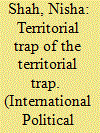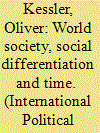| Srl | Item |
| 1 |
ID:
111926


|
|
|
|
|
| Publication |
2012.
|
| Summary/Abstract |
In the aftermath of the financial crisis of 2008/09, there was a remarkable preoccupation in the English-language press with gender relations in finance. Articles adduced masculinity as a variable that may have caused the crisis, speculated about the more prudent investment styles of women, and predicted the fall of macho and the end of men. Drawing on the work of Roland Barthes and Simone de Beauvoir, I argue that this discourse amounted to an exercise in meaning making through the construction of a myth of woman as financially responsible and men as reckless. I interpret the deployment of this myth in the press as a morality play of fall, rise, and redemption. The play provides a narrative that explains the unfamiliar of the crisis, offers a correcting mechanism in the form of prudent woman, and re-assembles a bourgeois worldview of social and economic harmony by advocating more gender diversity in finance.
|
|
|
|
|
|
|
|
|
|
|
|
|
|
|
|
| 2 |
ID:
111925


|
|
|
|
|
| Publication |
2012.
|
| Summary/Abstract |
The article provides a critical analysis of the performative effects of invocations of trauma and traumatic imagery during the sub-prime crisis. We develop a pragmatic approach to performativity that foregrounds the ambiguity between the importance of performative utterances, on the one hand, and overlapping performativities that produce subjects capable of "hearing" such utterances, on the other. We argue that a performative effect of the traumatic narrative of the sub-prime crisis was to constitute it as "an event" with traumatic characteristics. Financial subjects came to anticipate the object of financial salvation through intervention to save the banks; and such a view worked to curtail the range of political possibilities that were thinkable. Lines of pragmatic resistance are suggested, which turn the logic of trauma toward broadly progressive ends. In this way, the political dimension of performativity is brought forward: if finance is performative, then this only invites the question of how we might perform it differently.
|
|
|
|
|
|
|
|
|
|
|
|
|
|
|
|
| 3 |
ID:
111927


|
|
|
|
|
| Publication |
2012.
|
| Summary/Abstract |
The rise of Islamist parties to positions of political dominance in Turkey has been the subject of inquiry for scholars and concern for some American and European observers. This paper argues that this rise of Islamist political efficacy is the result of efforts to maintain state legitimacy in an era of neoliberalism. The integration of neoliberalism as a dominant political economic ideology reduces state economic regulatory capacities and social service endowment. The effect of this retrenchment is a commensurate reduction in state legitimation, as national populations view the state as unable-or unwilling-to meet requisite economic protectionist demands that were formerly exchanged for legitimate support. In an attempt to retain legitimate authority, neoliberal states are forced to move beyond economic protectionist strategies and embrace increasingly cultural legitimation approaches. We juxtapose the use of economic protectionist strategies in the 1945-1980 period with the integration of Islam as a cultural legitimation strategy following the 1980 coup in Turkey.
|
|
|
|
|
|
|
|
|
|
|
|
|
|
|
|
| 4 |
ID:
111928


|
|
|
|
|
| Publication |
2012.
|
| Summary/Abstract |
This paper argues that attempts by theories of globalization to overcome the "territorial trap" have failed. Describing how the modern state emerged with two interrelated territories-a political concept about bounded jurisdiction and public good that over time is effaced but reinforced as territory is defined as brute, physical terrain-it shows that the assumption in globalization theories that territory is the state's physical area entrenches the normative defense of the territorial state as the framework of political order. The consequence is that overcoming the territorial trap not only requires uncovering how and why territory becomes an assumed political ideal, but also how and why this trap produces the subsequent trap of understanding territory primarily as the "physical substratum" of the sovereign state. Globalization theories' analysis of political transformation must therefore focus not only on the "permeability" of territorial borders, but whether and how evolving notions of global space might be providing a different political theory. A preliminary discussion of efforts to uncover how an alternative global spatial principle is reassembling political authority suggests a possible means of escape and way forward.
|
|
|
|
|
|
|
|
|
|
|
|
|
|
|
|
| 5 |
ID:
111929


|
|
|
|
|
| Publication |
2012.
|
| Summary/Abstract |
In the current attempt to develop a Global Political Sociology, the concept of functional differentiation increasingly attracts attention. Functional differentiation seems to promise an avenue to describe global processes beyond a methodological nationalism. In this contribution I argue that while we have already made some progress in describing the spatial implications of functional differentiation, less effort has been spent on the temporal side of the story. This contribution highlights this aspect and points to shifting temporalities in the context of finance and international law. This perspective suggests that many "governance problems" might be due to the clash of different temporalities co-existing in world society.
|
|
|
|
|
|
|
|
|
|
|
|
|
|
|
|